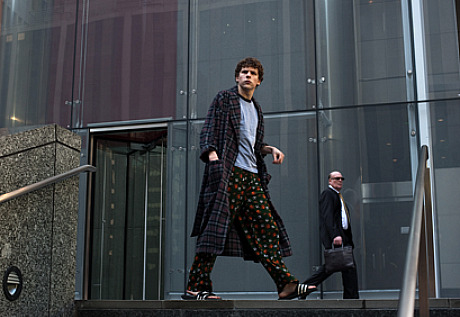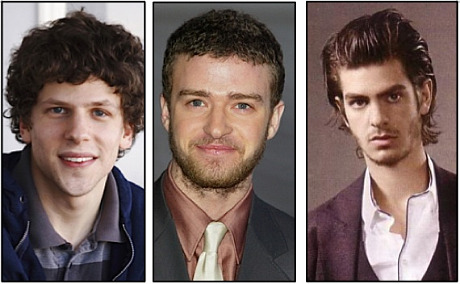David Fincher‘s The Social Network “is splendid entertainment from a master storyteller, packed with energetic incident and surprising performances,” writes former L.A. Weekly critic and NYFF associate director Scott Foundas. “It is a movie of people typing in front of computer screens and talking in rooms that is as suspenseful as any more obvious thriller.

Jesse Eisenberg as Mark Zuckerberg in The Social Network
“But this is also social commentary so perceptive that it may be regarded by future generations the way we now look to Gatsby for its acute distillation of Jazz Age decadence.
“There is, in all of Fincher’s work, an outsider’s restlessness that chafes at the intractable rules of ‘polite’ society and naturally aligns itself with characters like the journalist refusing to abandon the case in Zodiac and Edward Norton‘s modern-day Dr. Jekyll in Fight Club. (It is also, I would argue, what makes the undying-love mawkishness of The Curious Case of Benjamin Button seem particularly insincere.) So The Social Network offers a despairing snapshot of society at the dawn of the 21st century, so advanced, so ‘connected,’ yet so closed and constrained by all the centuries-old prejudices and preconceptions about how our heroes and villains are supposed to look, sound, and act.
“It would be easy enough, of course, to vilify” controversial Facebook founder Mark Zuckerberg (Jesse Eisenberg) “as a greedy twerp who betrayed his friends (what few he had) and partners on his way to the top — we are, after all, talking about a 24-year-old billionaire who once carried business cards reading ‘I’m CEO…bitch.’ It would be even easier, perhaps, to exalt him as a nonconformist deity, a Holden Caulfield of the information superhighway.
“But to the sure nervousness of the studio, and the potential discomfort of some viewers, Fincher and Sorkin chart a more treacherous course straight down the middle of Zuckerberg’s many contradictions, one in which there are no obvious winners or losers, good guys or bad — only a series of highly pressurized social (and genetic) forces.

(l. to r.) Jesse Eisenberg, Justin Timberlake, Andrew Garfield
“Adapted by The West Wing creator Aaron Sorkin from Ben Mezrich‘s nonfiction best-seller The Accidental Billionaires, The Social Network was one of those ‘buzz’ scripts that seemed to be on everyone’s lips in Hollywood for the past couple of years, and it’s easy to understand why. The writing is razor-sharp and rarely makes a wrong step, compressing a time-shifting, multi-character narrative into two lean hours, and, perhaps most impressively, digests its big ideas into the kind of rapid-fire yet plausible dialogue that sounds like what hyper computer geeks might actually say (or at least wish they did): Quentin Tarantino crossed with Bill Gates.
“Just as All the President’s Men — a seminal film for Fincher and a huge influence on his Zodiac — was less interested by the Watergate case than by its zeitgeist-altering ripples, so too is The Social Network devoted to larger patterns of meaning. It is a movie that sees how any social microcosm, if viewed from the proper angle, is no different from another — thus the seemingly hermetic codes of Harvard University become the foundation for a global online community that is itself but a reflection of the all-encompassing high-school cafeteria from which we can never escape.”
It’s funny that Foundas (whose “review” is obviously colored and perhaps modified by his responsibilities and alliances with the NYFF) notes that (a) the warts-and-all portrayal of Zuckerberg “risks the potential discomfort of some viewers” and yet (b) Foundas himself has no supportive words for Eisenberg’s performance. Hah! Especially since it appears that Eisenberg’s portrayal of the manic Zuckerberg is the most relentless expression of The Social Network‘s “no heroes or villains” viewpoint.
Foundas does, however, congratulate the “superb” Andrew Garfield, who plays Eduardo Severin, and Justin Timberlake as Napster founder Sean Parker, “who’s like Zuckerberg’s flamboyant, West Coast id.”

